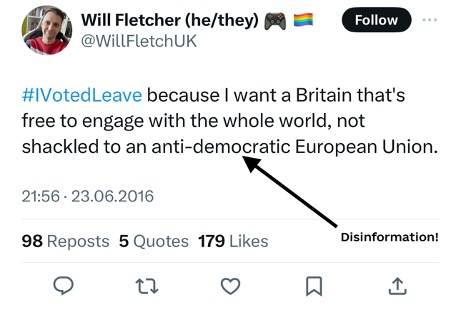
Mission possible! Combating disinformation about EU competence
Author: Ariel Katsev, Ukrainian YEA
When I’m surfing the internet, I often come across false accusations that the European Union (EU) is failing to act in different areas of public life. If I hadn’t finished my master’s degree at the University of Vienna, I too might have been upset about the EU’s supposed lack of action on important issues.
In these screenshots, you can see a few examples of such false claims. I didn’t spend too long trying to find such posts; I just searched by hashtags like “#Inaction” and “#EU.”



However, thanks to my education, I’ve come to realise that not everything for which people blame the European Union is actually the EU’s responsibility. So, why not take a closer look at the statements made by the people above?
The first screenshot: The claim that the European Union is anti-democratic is false. The EU operates under a system that includes elected representatives, such as the European Parliament, providing a democratic framework. Additionally, member states retain their sovereignty and the right to engage in international relations independently.
The second screenshot: The claim suggests that leaving the EU would allow for control over taxes and security. However, the EU doesn’t directly control national tax policies or security measures; these remain within the purview of individual member states. The decision to leave the EU may impact these aspects indirectly, but the assertion that the EU dictates taxes and security is inaccurate.
The third screenshot: Blaming the EU for the highest Covid infections oversimplifies the situation. The management of pandemics, including responses to COVID-19, largely falls under the jurisdiction of individual member states. While the EU may coordinate efforts and share information, attributing infection rates solely to the European government is inaccurate. National policies, healthcare systems, and public compliance play crucial roles. International collaboration is essential, but the responsibility for pandemic response primarily lies with individual governments, not with the EU as a singular entity.
However, these are not the only bad things that are said about the EU. Therefore, let’s explore some of the details that often get overlooked by those who criticise the EU for being inactive.
First things first, it is critical to understand how the EU and its member states share their powers in the complex system of European government. The EU adheres to fundamental principles and laws that define what it is capable of, ensuring a delicate balance between central authority and each country’s own power. To properly understand the legal rights and duties of the EU and its Member States (MSs), we need to examine these concepts.
1. Principle of Conferral
The hallmark of the EU’s legislative authority lies in the principle of conferral. This says that the Union can only act within the limits of the competences explicitly granted to it by Member States in the European Treaties (the Treaty establishing the European Community, the Treaty of Amsterdam, the Treaty of Lisbon, etc.). This ensures that the EU operates with a clear mandate and respects the sovereignty of its Member States.
As a general example of how the EU adheres to this principle, imagine that the European Union wants to pass antitrust regulations. The aforementioned treaties give the EU exclusive power in this area. Consequently, the Treaty of Lisbon allows the EU to enact measures to attain a high level of competition protection.
The legislative procedure would include proposals from the European Commission, debates and negotiations among Member States in the Council of the European Union, and the participation of the European Parliament. The principle of conferral ensures that the EU institutions function within the limitations of the competences allocated to them by the Member States in the treaties throughout this process.
2. Principle of Subsidiarity
Under the principle of subsidiarity, the EU acts only when individual Member States cannot achieve proposed action objectives adequately. This principle underscores the importance of decentralised decision-making, empowering Member States to address issues at national level whenever possible.
For example, in terms of public health, this principle becomes prominent in the European Union. While the EU will work together to combat cross-border health concerns and share best practices, individual Member States retain significant control over their national healthcare systems. During a public health crisis, such as a pandemic, coordination at the EU level may include information exchange, collaborative research activities, and resource-sharing facilitation. The day-to-day management of healthcare services, vaccination programmes, and particular public health initiatives, on the other hand, is mainly the responsibility of each Member State.
3. Principle of Proportionality
The third pillar, the principle of proportionality, advises that EU activities should not go beyond what is required to achieve the goals outlined in the European Treaties. This idea protects against inappropriate centralisation, and promotes a balanced approach to legislation.
The General Data Protection Regulation (GDPR) is a good practical example of the principle of proportionality in EU activities. The GDPR strikes a balance between individuals’ privacy rights and business demands for data processing. It guarantees that legislative actions, such as providing individuals with rights and placing requirements on organisations, are proportionate to the overall purpose of improving data protection. This approach demonstrates the EU’s determination to prevent excessive centralisation while establishing a balanced legislative framework.
Given the three mandatory components of the competence principle, we can delve deeper into the three categories of competence of the EU and its MSs outlined in the Treaty on the Functioning of the European Union:
Exclusive Competences (Article 3)
The EU possesses exclusive competences in several key areas, where only the Union can legislate. These include the Customs Union, Competition Rules, Monetary Policy for the Euro Zone, and the Conservation of Marine Biological Resources under the Common Fisheries Policy. These exclusive competences highlight the Union’s role as a central authority in specific policy domains.
Shared Competences (Article 4)
Shared competences indicate that both the EU and its Member States can legislate in a particular area. However, Member States cannot enact their own rules in shared competence areas where the EU has already acted. Notable shared competences include the internal market, social policy, agriculture, and fisheries grants (excluding marine conservation), among others. This dynamic reflects a sensitive balance between centralised and decentralised decision-making.
Supporting Competences (Article 6)
Supporting competences grant the EU only the ability to support Member States’ actions in specific areas. These include the protection and improvement of human health, industry, culture, tourism, education, youth, sport, vocational training, civil protection (disaster prevention), and administrative cooperation. These competences underline the EU’s role in fostering collaboration among Member States, while respecting their individual capacities. Keeping in mind that the EU has only supporting competence in the protection and improvement of human health, it is easier to understand why the EU is not playing a crucial role when combating pandemics such as COVID-19.
Disinformation can easily affect public opinion about EU competencies. People must be well-informed on the principles and sectors in which the EU actually operates. Misinformation about the distribution of powers can harm both the EU and the Member States’ credibility.
Understanding the nuances of exclusive, shared, and supporting competences is critical for establishing a transparent and accountable European government structure. Ensuring an open and informed public discussion about its powers is crucial to this process.
LATEST

How you can help the planet every day

Building Europe: Poland’s experience of joining the European Union and lessons for Ukraine

World Health Day 2024: My Health, My Right

EUREKA MEETS EUROPE – opportunities to develop and study. My experience

Can you wear pink in the workplace?
More campaign pages:
Interested in the latest news and opportunities?
This website is managed by the EU-funded Regional Communication Programme for the Eastern Neighbourhood ('EU NEIGHBOURS east’), which complements and supports the communication of the Delegations of the European Union in the Eastern partner countries, and works under the guidance of the European Commission’s Directorate-General for Neighbourhood Policy and Enlargement Negotiations, and the European External Action Service. EU NEIGHBOURS east is implemented by a GOPA PACE-led consortium. It is part of the larger Neighbourhood Communication Programme (2020-2024) for the EU's Eastern and Southern Neighbourhood, which also includes 'EU NEIGHBOURS south’ project that runs the EU Neighbours portal.

The information on this site is subject to a Disclaimer and Protection of personal data. © European Union,